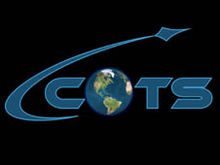
Commercial Orbital Transportation Services (COTS) was a NASA program to spur the development of private spacecraft and launch vehicles for deliveries to the International Space Station (ISS). Launched in 2006, COTS successfully concluded in 2013 after completing all demonstration flights.
NASA's final report on the program considered it a success and a model for future public-private collaboration. Compared to traditional cost-plus contracts employed by NASA, such as the $12 billion contract for the Orion spacecraft, the $800 million COTS investment resulted in "two new U.S. medium-class launch vehicles and two automated cargo spacecraft".[1] After the conclusion of the COTS program, NASA shifted towards fixed-price contracts for crew and cargo services. While the approach has significantly lowered costs for NASA, companies other than SpaceX have struggled under the fixed-price system, with some refusing to bid and others experiencing large losses on contracts.[2]
COTS contracts were awarded to SpaceX and Rocketplane Kistler, but the latter's agreement was terminated due to insufficient progress. Orbital Sciences Corporation replaced Rocketplane Kistler in the program in 2008.
COTS differs from the Commercial Resupply Services (CRS) program, which procured cargo delivery services using the COTS developed vehicles. COTS employed Space Act Agreements with milestone-based payments, while CRS utilizes binding contracts with strict performance obligations. The Commercial Crew Development (CCDev) program, focusing on crew transportation, is similar to COTS and, along with CRS, falls under NASA's Commercial Crew and Cargo Program Office (C3PO).
- ^ "NASA Releases COTS Final Report" (Press release). NASA. 3 June 2014. Archived from the original on 7 August 2020. Retrieved 8 June 2014.
- ^ Berger, Eric (23 July 2024). "SpaceX just stomped the competition for a new contract—that's not great". Ars Technica. Retrieved 24 July 2024.